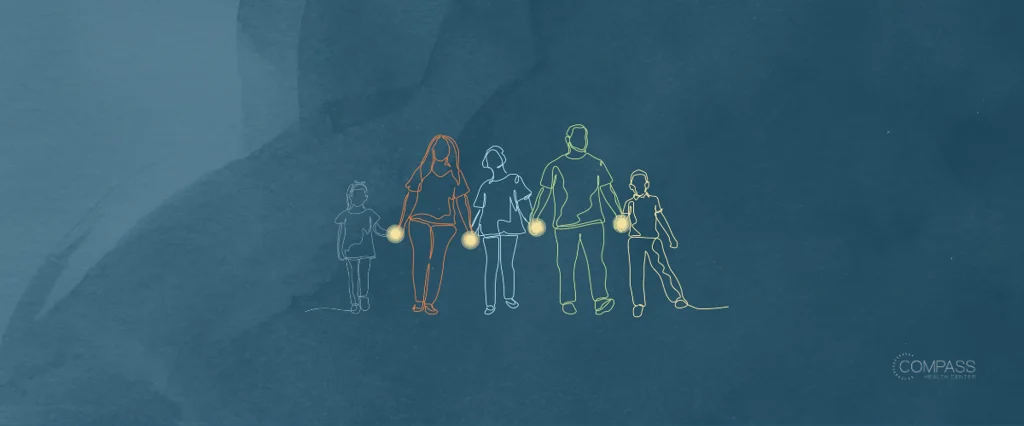
Understanding Co-Occurring Disorders: Q&A with Compass Psychiatrist & Medical Director, Deepali Gershan, MD
When mental health and substance use challenges show up at the same time, it can be hard to know where one ends and the other begins. For many, they’re deeply connected, shaped by past experiences, biology, and the ways we cope.
In this Q&A, Dr. Deepali Gershan, Psychiatrist, Addiction Specialist, and Medical Director of Over 18 Programs at Compass Health Center, offers insight into what co-occurring disorders look like in real life. She shares how clinicians approach diagnosis and treatment, what signs to watch for, and how individuals and families can begin to make sense of what’s happening.
Whether you’re navigating these challenges yourself or supporting someone who is, this conversation is meant to inform—not overwhelm—breaking down the complexity with compassion and clarity.
Dr. Gershan provides clinical care for young adults and adults in Compass Health Center’s Mental Health and Substance Use PHP and IOP programs. For a decade, she’s been committed to expanding access to substance use treatment—helping grow group-based substance programming, increase access to medication-assisted treatment (MAT), and launch Compass’s Virtual Mental Health and Substance Use Program during the peak of the COVID-19 pandemic.
Q: What comes first: Substance use or mental health problems?
Deepali Gershan, MD: We know that for some people, mental health problems can lead to the use of alcohol, cannabis, illicit drugs, misuse of prescription drugs, or over-the-counter medications. We also know that substance use can cause or exacerbate certain mental health disorders, particularly anxiety, depression, schizophrenia, and bipolar disorder. Mental health and substance use disorders share certain underlying causes, particularly early life exposure to trauma or stress and genetic vulnerabilities.1
Roughly half of people with a substance use disorder will have a mental health disorder at some point in their life and vice versa. According to the recent SAMHSA 2021 National Survey on Drug Use and Health, approximately 9 million adults in the United States have a co-occurring disorder, meaning both a mental health disorder and a substance use disorder.2
Q: How do you know if you have a dual diagnosis?
Deepali Gershan, MD: Having a Dual Diagnosis, also known as a Co-Occurring Disorder, means having both a diagnosed mental health disorder and a substance use disorder. If you have a diagnosed mental health disorder, use substances, and have noticed at least two of the following symptoms over the past 12 months, you should notify your healthcare provider.
- Increase in tolerance (needing more of a substance to achieve the same effect or a diminished effect with the same amount of use)
- Withdrawal symptoms
- Risky or hazardous use (using your substance in an unsafe environment or continuing to use substances despite worsening physical or psychological problems)
- Social or interpersonal problems with substance use (impairment in work, school, home responsibilities)
- Continued substance use despite physical or psychological problems caused or exacerbated by substance use
- Neglecting major role responsibilities (work, school, home) because of substance use
- Important activities are given up or reduced because of substance use
- Repeated attempts or unsuccessful attempts to reduce, quit or control substance use
- Impaired control over your substance use (consuming larger amounts or over a longer period of time than intended)
- Spending excessive time obtaining substances or recovering from the effects of use
- Cravings3
Q: How can one identify the right treatment path for them?
Deepali Gershan, MD: If you are experiencing physical withdrawal symptoms, it is important to urgently seek medical attention to assess and prevent potentially serious or life-threatening withdrawal. If you are not experiencing any acute concerns, schedule a time to speak with your mental health provider, therapist, psychiatrist/NP/PA, primary care physician, or any medical provider with whom you have a trusted relationship. Be honest about your symptoms so you can be referred to the appropriate level of care to safely treat your physical health needs, including withdrawal and mental health concerns. Treatment for mental health and substance use disorders is often a journey, so be patient with your progress and engage with your healthy supports, including friends, family members, and loved ones. .png)
Mental Health & Substance Use: Finding the Right Support
As Dr. Gershan shared, treating co-occurring mental health and substance use requires more than just addressing symptoms—it requires understanding the person as a whole. That includes recognizing how experiences like trauma, stress, genetic vulnerabilities, and life circumstances intersect, and how coordinated care can make a meaningful difference.
Compass Health Center has reimagined what this kind of care can look like. Our enhanced program supports teens, young adults, and adults with integrated treatment plans tailored to each individual’s goals—whether that’s reduction, moderation, or abstinence. With same-day access, early psychiatric support, and a multidisciplinary team trained in substance use and mental health, we’re focused on delivering accessible care , both in-person and virtually.
Co-occurring disorders are common, but they don’t have to be faced alone. With the right support, meaningful change is possible.
Learn more about Mental Health and Substance Use treatment.
Citations
- MentalHealth.gov
- SAMHSA 2021 National Survey on Drug Use and Health
- Diagnostic and Statistical Manual of Mental Disorders, Fifth Edition


